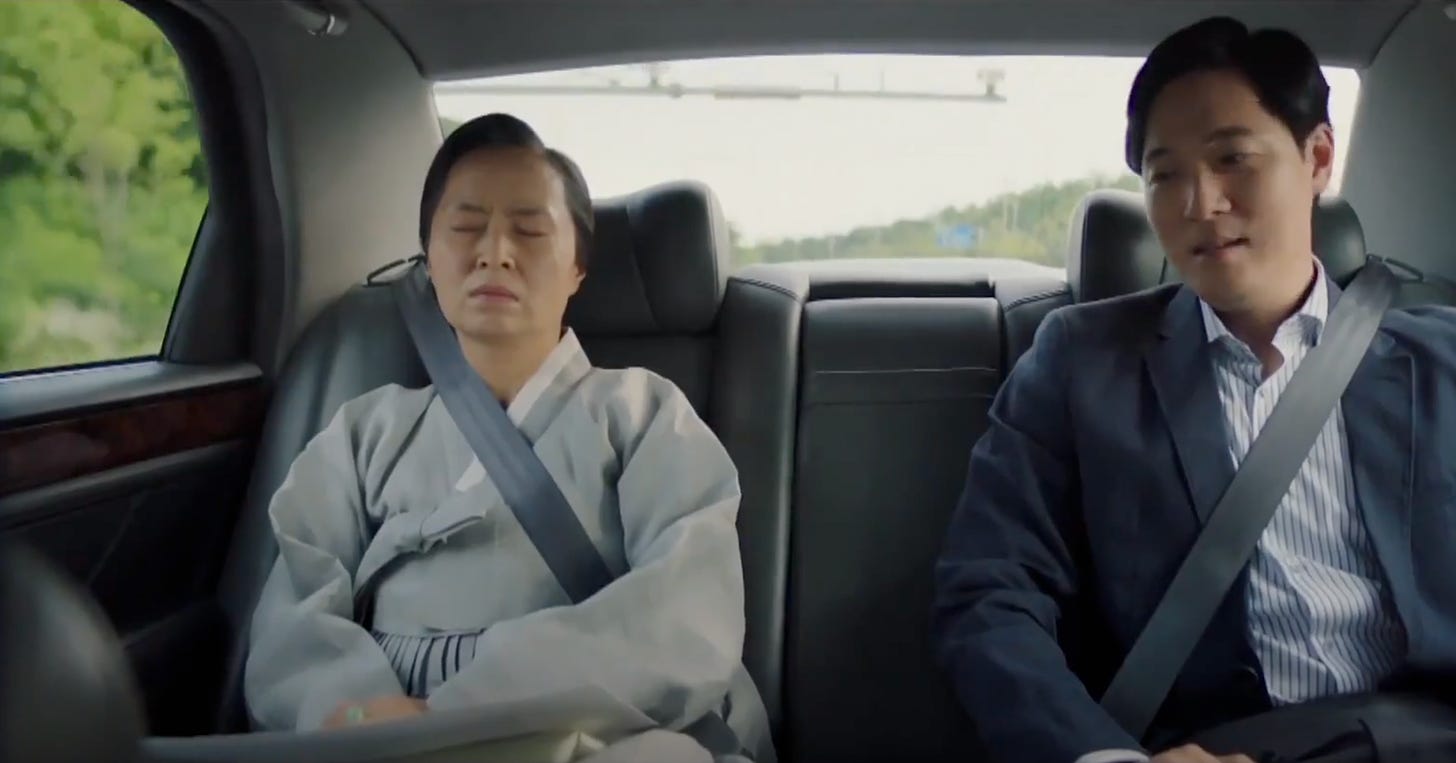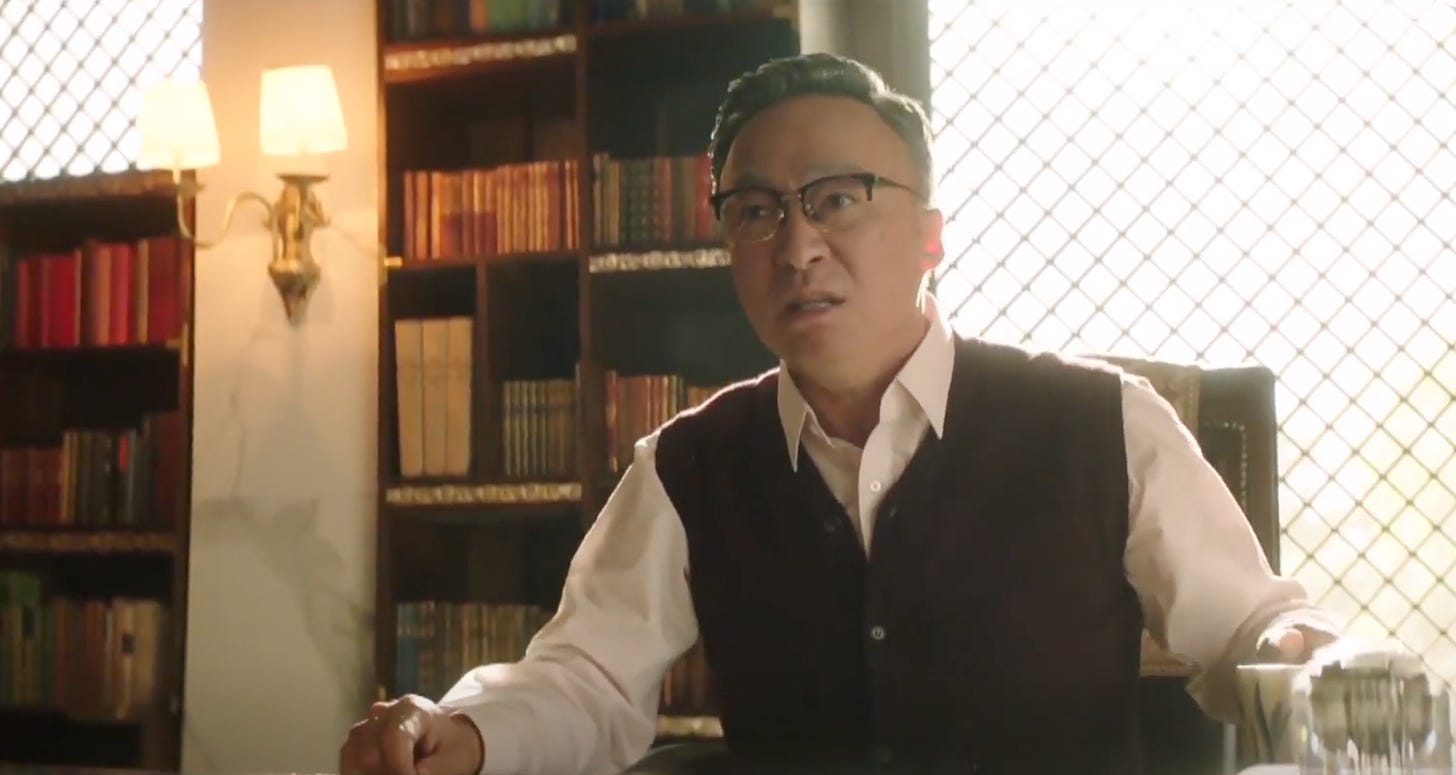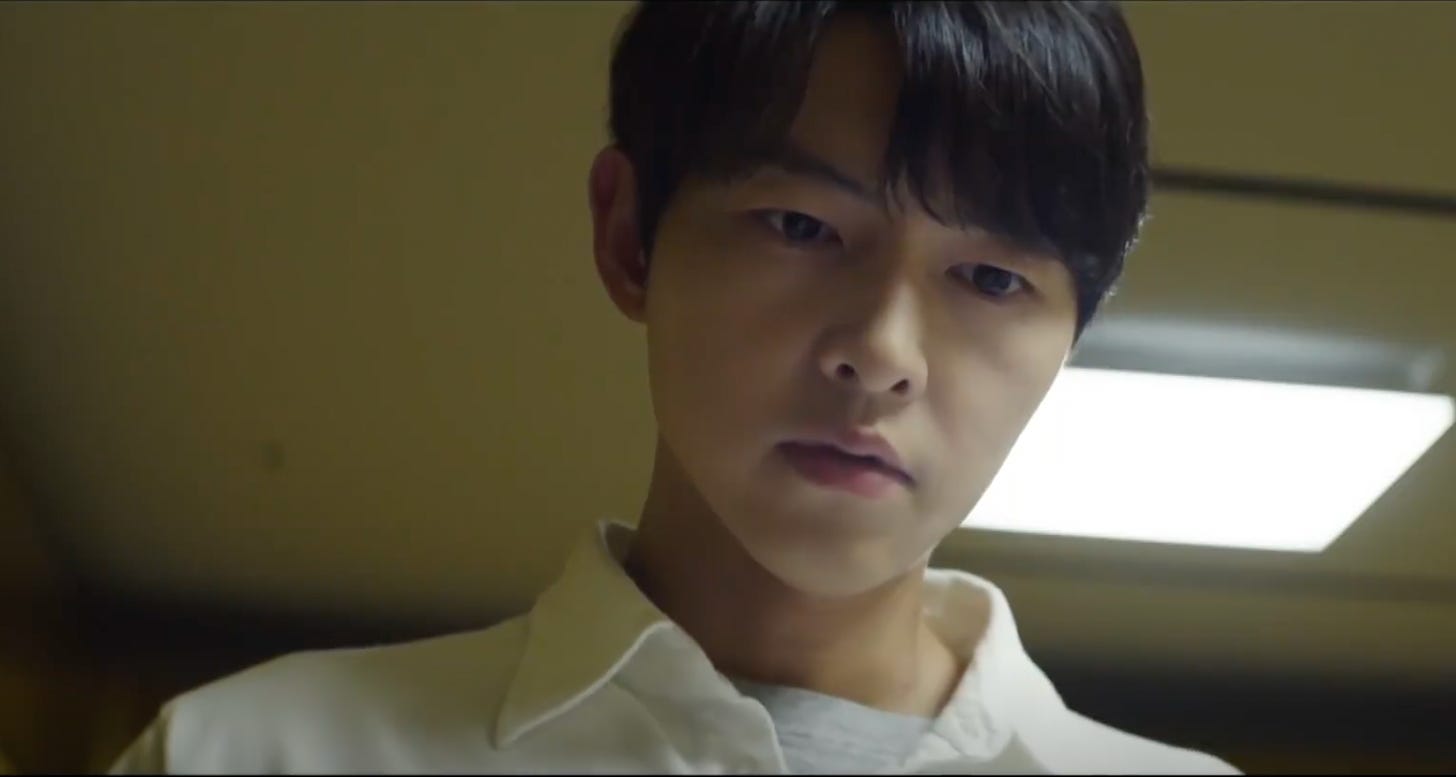Reborn Rich (2022) Episodes 12-14
There’s a lovely moment in the car between Do-jun’s dad, Yoon-ki and Grandmother Lee Pil-ok where the former declares that he’s been walking on eggshells around her his entire life. His entire life, he says has been one long protest against her. A quiet revolt as it were. From the first day he officially entered the fold, he was made to feel his place — not just as the son born out of wedlock to another woman but also as the outsider who was told that he was not in line for succession. Now that Yoon-ki himself is the father of an ambitious son who is eager to take over the reins of Soonyang, he tells her that (for the first time in his life) he understands where she’s coming from — it’s an innate parental impulse to want the best for your children, to protect them from all external threats. Even to the extent of eliminating them by any means possible. On hearing this Pil-ok breaks down and sobs.
That pivotal scene serves to delineate the contrast between the so-called good guys and the bad ones. It isn’t that the good guys lack the covetous impulse — human beings live with all kinds of desires, spoken or unspoken — but that the best of us are self-aware, able to reflect on our foibles. Even while Yoon-ki finds himself becoming more ruthless for Do-jun’s sake, the difference between him and Young-ki is that he knows that he’s crossed an unholy line. What’s also suggestive about this scene is that it demonstrates to Pil-ok that the perceived “threat” is far more empathetic than her eldest child. All that she’s done for Young-ki — keeping Yoon-ki at bay and instigating the car accident — is not appreciated because of the unforeseen outcome: Do-jun gains the upper hand as a result. He now has enough leverage to get what he wants from Pil-ok. Which leaves Young-ki with nothing to bargain with.
Ultimately all the high finance talk about shares, marketing and splitting up the company is just part of the world building. What’s really at stake here like many other historical dramas is the succession issue. Like this year’s Under the Queen’s Umbrella or Red Heart, the question that underpins all the action is really a conversation about worthiness. It isn’t enough to be the son of a king or even the oldest surviving son of a king. The contender has to prove that he has the wherewithal to take sword out of the stone. Or in the case of Thor, to wield Mjolnir and be worthy of its mantle. A sense of entitlement or ambition isn’t enough. The ideal candidate has to have other qualities not only to secure his position but to secure the longevity of the entity — whether that’s a country or enterprise — that he will be responsible for. Jin Yang-cheol calls Soonyang his child but none of his progeny have really come to grips with what that means to him. The problem for Jin Yang-cheol is that his children might have the ambition and the ruthlessness to take ownership but none of the long-term agility or moral insight to make it work.
All the ambition in the world certainly doesn’t save Dong-ki from himself. Clearly he doesn’t have the intelligence to pull it off. Even his name sounds to an English speaker to be a bit of an inside joke — he is an ass. He is resentful about being the spare and not the heir but his pigheaded blind reliance on fortune-telling are his undoing. In that regard he has disqualified himself from the race.
Yong-ki, on the other hand, is clinging on to his primogeniture status for dear life in large part to leave a legacy to his son. Is it enough to be the parent who will do anything for the child in this instance? The answer is easily a “no”. Being the oldest son and child doesn’t automatically guarantee that the talent transfers to the next generation even with all the best grooming in the world. Yong-ki tends to play it safe while his younger brother tends to be reckless. His son is smart and ruthless but he doesn’t care about the long-term viability of the company as long as he’s the man in charge of it in accordance to his birthright.
Lee Hang-jae, Jin Yang-cheol’s right hand man can see all of that. And he does have skin in the game as someone who has been there from the beginning even if he is a “servant”. So he’s jumping on the Do-jun bandwagon after being stabbed in the back by Jin Sung-jun. The evidence of a slush fund hidden behind the shell corporation that was featured in the first episode finally gets an explanation in Episode 14. It was apparently set up by the late chairman for his successor. So was Lee Hang-jae really given the role of regent and king maker? That revelation however begs the question as to why Jin Young-ki and his heir in the previous timeline did not know of its existence. How did it get lost with other documents if it was so valuable?
The whole Soonyang Card debacle is more evidence of why the Jin brothers should not be near the top job. It isn’t just that they’re willing to cross all kinds of unethical lines to achieve their goals but also the fact that they don’t care about the consequences of their actions on the end consumer. Again. They don’t seem to get it at all. Credit cards are a terrible scourge on society. Competition between companies means that all kinds of people who probably shouldn’t be allowed one have access to ridiculous amounts of credit that they can never repay. While it’s true that Do-jun was the one who sold Soonyang Card to his second uncle with more than an inkling as to what could happen, the comment to Young-ki still applies. It is hypocritical for either of them to be moralizing about how the plebs thoughtlessly spend money but Do-jun’s comment that Young-ki could have used the money to bail out Soonyang Card instead of using it buy Do-jun’s shares is also a statement about how little Young-ki cares about the company’s integrity or its customer base. It is indicative that Young-ki only sees the company as his vehicle to consolidate his position and his son’s. In his eyes, the chairman’s job is his rightful place by virtue of birth order.
As is also the case in Under the Queen’s Umbrella where there are a whole host of contenders for the throne, the candidates here have their own beliefs as to why they should be the one to call the shots. The Jin siblings naturally thinks that they’re the best fit but their reasons for thinking so don’t bear intense scrutiny. As Queen’s Umbrella shows in clear terms, I’m not a big fan of conspiracies to unseat incumbent leadership unless he/it is running the country to the ground with his/its fatuousness. Regardless of how he gets the top job, once he takes charge and does a good job, plots against him are treasonous. The destabilization of a reigning monarch regardless of the “legitimacy” of his enthronement has ripple effects and innocents get caught in the crossfire. Unless the regime is obviously tyrannical to the point of destructiveness, there’s very little reason to engineer a coup.
I suppose Do-jun has his reasons for not telling Min-yeong his plans but it’s almost impossible to have a long-term relationship of this nature without honest communication. Intimacy begins outside of the bedroom and there are plenty of roadblocks in that relationship. To be honest, I don’t feel the romance is given enough air time to make it worth commenting about except for the fact that Do-jun’s life looks destined to be lonely. It is ironic because his cousin Sung-jun is doing a lot better in that regard even if his marriage is more of a business partnership with benefits. What is the show trying to say — that Do-jun can get Soonyang but he can’t get the girl? Does it have to be a zero sum game? It’s hard to say at this point where the show is going with all this.
The issue of whether compassion is an Achilles’ heel is not as clear cut as Jin Yang-cheol makes it out to be. Looking at Do-jin’s track record I’d say it’s a double-edged sword. Over time he has managed to win hearts and minds over to his cause as in the case of the chauffeur who acted as a buffer. Even Jin Yang-cheol isn’t unmoved by it. Undoubtedly compassion without discernment can be deadly. It could be that compassion isn’t adequate enough a word to describe how Do-jin sees his subordinates or camarades-in-arms.





